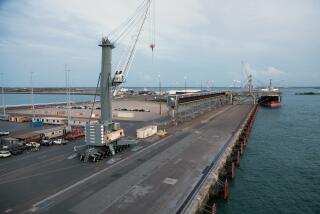Foreign Investors Buy Up Australian Companies : Markets: Analysts attribute trend to undervalued assets, government policy and poor corporate management.
- Share via
SYDNEY, Australia — Australian nationalists are cringing at a surge in foreign investment as the country experiences its biggest rush of takeover activity since the stock market crash of 1987.
The past year has seen offshore investors in Australia tighten their grip. But unlike the 1970s, when such foreign control would have spawned bitter parliamentary debate and public outcry, hardly a whisper of protest has been heard.
Since mid-July, the pace has quickened with five deals that have driven a virtual stake through any lingering nationalistic urges to keep offshore investors at bay.
In late August, Australia’s national airline, Qantas Airways, revealed official figures showing foreign investment in the carrier punching through a 49% ceiling set by the government after its debut on the stock exchange.
On Aug. 7, U.S.-based energy group Utilicorp United Inc. bought the United Energy electricity distribution group, based in the state of Victoria. A day later, local shareholders approved a bid by French-based Axa SA to control Australian life insurance firm National Mutual.
Aug. 3 saw the sale of some of Australia’s top food brands to foreigners after Pacific Dunlop Ltd. sold its local food operations for A$1.06 billion ($788 million) to Swiss food giant Nestle SA and the U.S.-based J.R. Simplot group.
On July 21, British-based BTR Plc announced a bid for the remaining 37% of Australian industrial group BTR Nylex it did not already own. If it succeeds, the A$4.48-billion ($3.33-billion) deal would be Australia’s largest takeover.
“People today are looking right around the world and Australia seems to stand out,” said Winston Sammut, associate equities director at Barclay’s Australian Investment Services. “Companies are looking within their own markets to try and grow and eventually they have to look offshore.”
Some say it’s a case of Australian assets being cheap on a global scale. Others blame it on poor corporate management and a government willing to invite offshore investment by promoting the nation as an export gateway into Asia.
But many Australians harbor fears of an inexorable escalation of offshore investment and an eventual sale of large slices of national icons into foreign hands, said Harry Wallace, president of the Australian Owned Companies Assn.
Wallace formed his organization four years ago to fend off large-scale foreign investment, enlisting the support of several big Australian companies such as oil and gas group Ampolex Ltd.
“There are some who feel very despondent that so much is now gone and that what’s the point in complaining because we have a government that’s committed to the course,” Wallace said.
“It’s far from a temporary phenomenon. It’s something all Australians should be petrified about.”
Although the trend can be traced back to the 1920s when Australia’s prized and homespun sandwich spread, a salty yeast extract known as Vegemite, was bought by U.S. food conglomerate Kraft, it didn’t gather pace until the late 1980s.
One-time Australian icons that are now under the thumb of foreign investors include Speedo bathing suits, Drizabone bush jackets, Bushells tea, Bundaberg rum and Tooheys beer.
Deregulation of the economy in the 1980s played a large role as tariff walls crumbled and ushered competition into the nation’s manufactured export industries. Focus has eventually turned to Australia’s potential as an export base into Asia.
“We’ve wound back protection and are a more outward-oriented market than in the past. That’s had an effect on investment,” said Marcus Tuck, strategist at broker James Capel Australia.
Australia’s large debt load and gaping A$27-billion ($20-billion) current account deficit have also fostered a reliance on foreign funds to finance rising debt-servicing costs.
“Australia is a major demander of capital and we need to attract equity and debt capital to finance our current account,” said John Larum, chief economist at broker SBC Warburg.
“But also, in recent times, the management of these companies has not been as good as it might have been and therefore it attracted some overseas investments to take over those they think they can get a better return on.”
But most experts agree foreign investment should continue climbing until the values on Australia’s stock market begin matching their global counterparts.
The Australian market, unlike many other world bourses, has yet to fully recover from the 1987 crash, Tuck said.
“I think the overseas investor is recognizing the value that undoubtedly exists in our share-market at the moment,” Tuck said. “They are taking advantage of the buying power they have to snap up bargains.”
More to Read
Inside the business of entertainment
The Wide Shot brings you news, analysis and insights on everything from streaming wars to production — and what it all means for the future.
You may occasionally receive promotional content from the Los Angeles Times.









